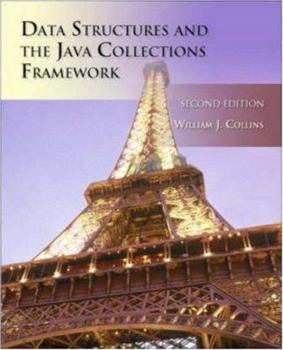Data Structures and the Java Collections Framework
Select Format
Select Condition 
Book Overview
Instead of emphasizing the underlying mathematics to get programmers to build their own data structures, Collins enables them to manipulate existing structures in the Java Collections Library. This... This description may be from another edition of this product.
Format:Hardcover
Language:English
ISBN:0073022659
ISBN13:9780073022659
Release Date:April 2004
Publisher:McGraw-Hill Science/Engineering/Math
Length:784 Pages
Weight:3.10 lbs.
Dimensions:1.3" x 7.6" x 9.4"
Customer Reviews
2 ratings
Excellent book
Published by Thriftbooks.com User , 17 years ago
I found this book to be very helpful in learning data structures. I read it on my own, without help from a teacher and was able to understand everything thanks to the thorough and step-wise coverage of the material. The only exception was the chapter on algorithm analysis, which I agree is not easy to grasp. But I was more interested in the structures themselves and what each one was efficient at, so the math analysis wasn't that important to me. The math isn't as important as understanding what makes one function faster than another. One of the previous reviewers complained that this book focused too much on object-oriented programming and the Java language. I think that criticism is poor, since the title states the book is about Java. I really like the author's approach of covering the Collections framework while discussing data structures because a lot of introductory programming courses in Java don't cover Collections very well, or at all. He introduces the framework at the beginning of the book and as he goes through each kind of data structure he creates his own simple implementation that the student can follow along with. Once that it is understood he describes the way that the Collections framework officially implements it and points out how the differences will affect programmers who use it. That step-wise approach to each topic is very effective. I recommend this book. Just skip chapter 3.
Great introduction to data structures
Published by Thriftbooks.com User , 17 years ago
Almost three years ago I read a data structures book which used Java for implementation of the topics covered. Perhaps I did not have a solid grasp of the Java language back then, but the book was one of the worst I have come across - I don't even remember the name. "Data Structures and the Java Collections Framework" on the other hand is one of the most up-to-date books available and certainly one that I will remember for quite some time. Not only does it cover the theory behind many of the fundamental data structures such as arrays, stacks, queues, trees, graphs, maps, etc. but it also illustrates common algorithms required by those data structures. For a book covering this kind of material that would have been enough, but this book excels in showing implementations with the latest version of Java. Furthermore, this book's purpose is not to teach Object Oriented programming with Java, or the latest features of version 1.5 (Generics, foreach loop, boxing, vararg). The author assumes those were taught in an introductory Java course. Thus, the book does accomplish its goal to teach data structures using Java, and taking advantage of OO design and the latest features of the language. And for those who need a quick refresher two review chapters are included that quickly cover the most commonly used features of Java, as well as javadoc and packages. As many other technical books, this one contains its share of typos and errors - nothing major though. Later in the book, only parts of the entire implementation of certain data structures are presented, but yet there is no mention that the book's website contains that and more. Also, an introduction to JUnit could have made this book better. The part that readers will find most useful about Mr. Collins' book is the future applicability of the Java Collections Framework. There are many poorly written books that deal with data structures and books about the Collections Framework. And yet this book does an outstanding job with the two subjects. A great book to learn data structures from - Highly recommended.






